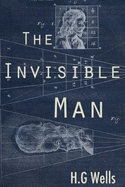
And if it is only death which can bring redemption-in the symbolic form of a return to visibility-then ending the novel on that image is also thematically perfect. Circularly-speaking, a story that starts with an invisible man which ends with that man now visible is just about a perfect as it gets.

The death of Griffin which brings his visible form back to normal would seem to be the perfect climax from literary perspective. Which raises the significance of the novel’s epilogue to a new level. Psychologically speaking, Wells had to know he wasn’t covering particular fertile and untilled territory on that aspect.

The second thing of importance is the idea of invisibility having the power to make men do things they would not do under normal circumstances had been explored in literature going at least as far as back as far back as Plato’s ring of Gyges. One, Griffin enjoyed a fair amount of privilege-not extensive and certainly not bottomless, but definitely some-and so really doesn’t quite qualify as a typical member of society. But it is important to remember two things. That much is true and mostly beyond argument. The indication is that Griffin was typical-no more or less corrupt than average-before he found the secret to invisibility and that it was the invisibility which corrupted him totally. This novel is often viewed solely within the context of Wells writing about the inherent corruptibility of man. But Wells was also a social critic immersed in the politics and culture of the day. Wells is remembered today primarily as one of the godfathers of science fiction. So, the much better question to ask-for the sake of analysis-is whether a more proper title for the novel might not be “The Invisible Men” with a plural? But is he really the invisible man? Again, the answer is obvious: yes. Griffin, the mad scientist whose half-genius at unlocking the secrets to invisibility but not the secrets to the way back, is clearly an invisible man. Wells’ novel? The most obvious-and correct-answer would be, of course, Griffin. We are thankful for their contributions and encourage you to make your own.

These notes were contributed by members of the GradeSaver community.


 0 kommentar(er)
0 kommentar(er)
